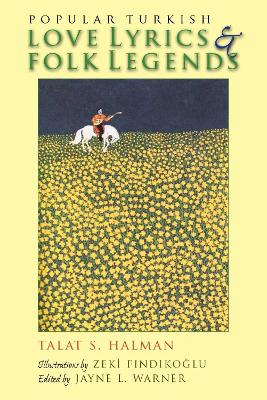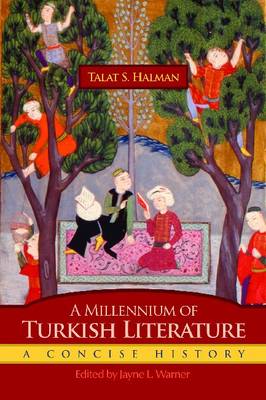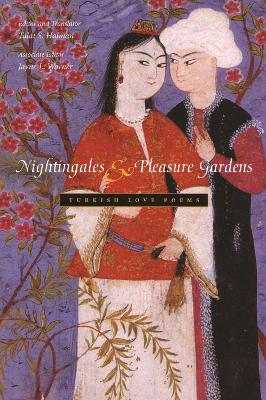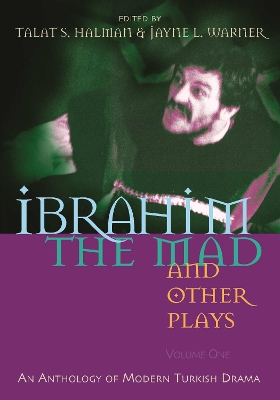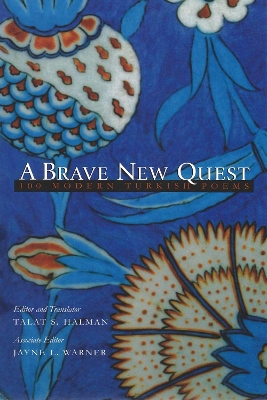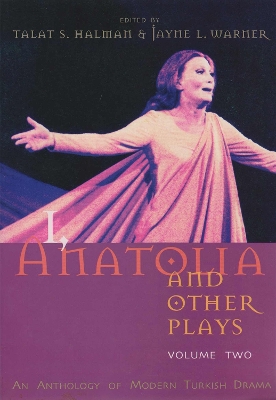Middle East Literature In Translation
6 total works
Popular Turkish Love Lyrics and Folk Legends is the first illustrated anthology of Turkish folk poetry and legends published in the United States. Talat Halman's eloquent, fluid telling of these engaging stories and his translations of the love lyrics, accompanied by Zeki Findikoglu's vibrant serigraphs, serve as a marvelous introduction to the rich world of Turkish folktales and lyrics. This volume brings together three of the most beloved of Anatolian tales and legends with the life stories and selected poems of four great folk poets - Yunus Emre, Pir Sultan Abdal, Koroglu, and Karacaoglan. The seven sections of the book come alive with images of striking beauty and dramatic power by Findikoglu, a son of Anatolia. Each section features four 'visual experiences' - extraordinary in their delineation of nature and human figures, teeming with moods stirring or sinister. They capture not only the splendor of nature in Anatolia but also the quintessential spirit of the legends and the lyrics. Cultural and literary historians as well as poetry lovers will enjoy this stunning union of art and literature.
From Orhon inscriptions to Orhan Pamuk, the story of Turkish literature from the eighth century A.D. to the present day is rich and complex, full of firm traditions and daring transformations. Spanning a geographic range from Outer Mongolia and the environs of China through Inner Asia, the Caucasus, the Middle East and North Africa, the Balkans and Europe all the way to North America, the history of Turkish literature encompasses an amalgam of cultural and literary orientations that embraced such traditions and influences as Chinese, Indian, Turkic, Mongolian, Uyghur, Russian, Arabo-Persian, Islamic, Sufi, Judaeo-Christian, Greek, Mesopotamian, Roman, Byzantine, European, Scandinavian, North American, and Latin American. Always receptive to the nurturing values, aesthetic tastes, and literary penchants from diverse civilizations, Turkish culture succeeded in evolving a sui generis personality. It clung onto its own established traits; yet, it was flexible enough to welcome innovations-or even revolutionary change. A Millennium of Turkish Literature tells the story of how literature evolved and grew in stature on the Turkish mainland in the course of a thousand years. The book features numerous poems and extracts, most in fluid translations by Talat S. Halman. This volume provides a concise, but captivating, introduction to Turkish literature and, with selections from its extensive ""Further Reading"" section, serves as an invaluable guide to Turkish literature for course adoption.
The earliest Turkish verses, dating from the sixth century A.D., were love lyrics. Since the love has dominated the Turks' poetic modes and moods - pre-Islamic, Ottoman classic, folk, modern. In style, form and sensibility, this collection offers a broad spectrum: virtual all types and varieties are represented here. The English versions are loyal to the originals and strive to be authentic poems in English. Here are lyrics from pre-Islamic Central Asia, passages from epics, mystical ecstasies of such thirteenth-century figures as Rumi and Yunus Emre, classical poems of the Ottoman Empire (including Suleyman the Magnificent and women courtly poets), lilting folk poems and the work of the legendary communist Nazim Hikmet (who is arguably Turkey's most famous poet internationally) and the greatest living Turkish poet, Fazil Husnu Daglarca. The verses in this collection are true to the Turkish spirit as well as universal in the appeal. They show how Turks praise and satirize love, how they see it as a poetic experience Poetry was for many centuries the premier Turkish genre and love its predominant them Some of the best expressions of that happy coalescence can be found in this volume.
Since the middle of the twentieth century, Turkish playwriting has been notable for its verve and versatility. This two-volume anthology is the first major collection of modern Turkish plays in English - a selection dealing with ancient Anatolian mythology, Ottoman history, contemporary social issues, family dramas, and ribald comedy from Turkey's cities and rural areas. It also includes several plays set outside Turkey.The two volumes together will feature seventeen plays by major playwrights published or produced from the late 1940s to the 1990s, with volume 1, ""Ibrahim the Mad"" and Other Plays, encompassing plays from the 1940s through the 1960s, and volume 2, ""I, Anatolia"" and Other Plays, including plays from the 1970s through the 1990s. They grant to English readers the pleasure of riveting drama in translations that are colloquial as well as faithful. For producers, directors, and actors they provide a wealth of fresh, new material, with characters ranging from Ottoman sultans to a Soviet cosmonaut, from the Byzantine Empress Theodora to a fisherman's wife, from residents of an Istanbul neighborhood to King Midas, from Montezuma to a Turkish cabinet minister.
This book contains a representative selection of modern Turkish poems that conveys in faithful translations the full spectrum of Turkish emotions, humor, intellectual explorations, joys, and agonies. This anthology features a wide variety of poems about social justice, love, evocations of history, humanitarian concerns, and other themes. It contains stirring examples of the revolutionary romanticism of Nazim Hikmet; the passionate wisdom of Fazil Husnu Daglarca; the wry and captivating humor of Orhan Veli Kanik; the intellectual complexity of Oktay Rifat and Melih Cevdet Anday; the modern mythology of Ilhan Berk; the subtle brilliance of Behcet Necatigil; the rebellious spirit of the socialist realists; the lyric flow of the neoromantics; and the diverse explorations of younger poets. These poems are infused with their own unique flavors while speaking in an unmistakably universal style.
Since the middle of the twentieth century, Turkish playwriting has been notable for its verve and versatility. This two-volume anthology is the first major collection of modern Turkish plays in English, with subjects ranging from ancient Anatolian mythology and Ottoman history to contemporary social issues, family dramas, and ribald comedy from Turkey's cities and rural areas. It also includes several plays set outside Turkey.
The second volume, I, Anatolia and Other Plays, presents eight major plays from the 1970s through the end of the millennium, including Bald Mehmet of Atca; Old Photographs; The White Gods; I, Anatolia; and, Afife Jale. Together, the two volumes grant English-language readers the pleasure of riveting drama in translations that are colloquial as well as faithful. For producers, directors, and actors, they provide a wealth of fresh new material, with characters ranging from Ottoman sultans to a Soviet cosmonaut, from the Byzantine empress Theodora to a fisherman's wife, from residents of an Istanbul neighborhood to King Midas, from Montezuma to a Turkish cabinet minister.
The second volume, I, Anatolia and Other Plays, presents eight major plays from the 1970s through the end of the millennium, including Bald Mehmet of Atca; Old Photographs; The White Gods; I, Anatolia; and, Afife Jale. Together, the two volumes grant English-language readers the pleasure of riveting drama in translations that are colloquial as well as faithful. For producers, directors, and actors, they provide a wealth of fresh new material, with characters ranging from Ottoman sultans to a Soviet cosmonaut, from the Byzantine empress Theodora to a fisherman's wife, from residents of an Istanbul neighborhood to King Midas, from Montezuma to a Turkish cabinet minister.
